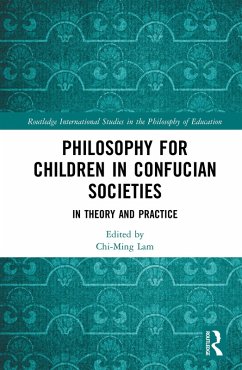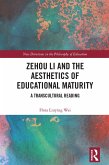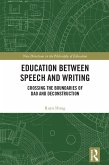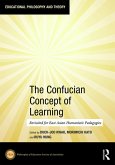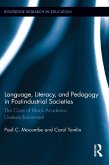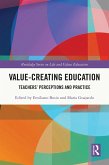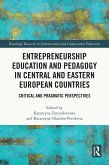Philosophy for Children in Confucian Societies (eBook, ePUB)
In Theory and Practice
Redaktion: Lam, Chi-Ming
41,95 €
41,95 €
inkl. MwSt.
Sofort per Download lieferbar

21 °P sammeln
41,95 €
Als Download kaufen

41,95 €
inkl. MwSt.
Sofort per Download lieferbar

21 °P sammeln
Jetzt verschenken
Alle Infos zum eBook verschenken
41,95 €
inkl. MwSt.
Sofort per Download lieferbar
Alle Infos zum eBook verschenken

21 °P sammeln
Philosophy for Children in Confucian Societies (eBook, ePUB)
In Theory and Practice
Redaktion: Lam, Chi-Ming
- Format: ePub
- Merkliste
- Auf die Merkliste
- Bewerten Bewerten
- Teilen
- Produkt teilen
- Produkterinnerung
- Produkterinnerung

Bitte loggen Sie sich zunächst in Ihr Kundenkonto ein oder registrieren Sie sich bei
bücher.de, um das eBook-Abo tolino select nutzen zu können.
Hier können Sie sich einloggen
Hier können Sie sich einloggen
Sie sind bereits eingeloggt. Klicken Sie auf 2. tolino select Abo, um fortzufahren.

Bitte loggen Sie sich zunächst in Ihr Kundenkonto ein oder registrieren Sie sich bei bücher.de, um das eBook-Abo tolino select nutzen zu können.
This book contributes to the theory and practice of Philosophy for Children (P4C), with a special emphasis on theoretical and practical issues confronting researchers and practitioners working in contexts that are strongly influenced by Confucian values and norms.
- Geräte: eReader
- mit Kopierschutz
- eBook Hilfe
Andere Kunden interessierten sich auch für
![Zehou Li and the Aesthetics of Educational Maturity (eBook, ePUB) Zehou Li and the Aesthetics of Educational Maturity (eBook, ePUB)]() Flora Liuying WeiZehou Li and the Aesthetics of Educational Maturity (eBook, ePUB)40,95 €
Flora Liuying WeiZehou Li and the Aesthetics of Educational Maturity (eBook, ePUB)40,95 €![Nature, Art, and Education in East Asia (eBook, ePUB) Nature, Art, and Education in East Asia (eBook, ePUB)]() Nature, Art, and Education in East Asia (eBook, ePUB)36,95 €
Nature, Art, and Education in East Asia (eBook, ePUB)36,95 €![Education between Speech and Writing (eBook, ePUB) Education between Speech and Writing (eBook, ePUB)]() Ruyu HungEducation between Speech and Writing (eBook, ePUB)43,95 €
Ruyu HungEducation between Speech and Writing (eBook, ePUB)43,95 €![The Confucian Concept of Learning (eBook, ePUB) The Confucian Concept of Learning (eBook, ePUB)]() The Confucian Concept of Learning (eBook, ePUB)41,95 €
The Confucian Concept of Learning (eBook, ePUB)41,95 €![Language, Literacy, and Pedagogy in Postindustrial Societies (eBook, ePUB) Language, Literacy, and Pedagogy in Postindustrial Societies (eBook, ePUB)]() Paul C. MocombeLanguage, Literacy, and Pedagogy in Postindustrial Societies (eBook, ePUB)45,95 €
Paul C. MocombeLanguage, Literacy, and Pedagogy in Postindustrial Societies (eBook, ePUB)45,95 €![Value-Creating Education (eBook, ePUB) Value-Creating Education (eBook, ePUB)]() Value-Creating Education (eBook, ePUB)42,95 €
Value-Creating Education (eBook, ePUB)42,95 €![Entrepreneurship Education and Pedagogy in Central and Eastern European Countries (eBook, ePUB) Entrepreneurship Education and Pedagogy in Central and Eastern European Countries (eBook, ePUB)]() Entrepreneurship Education and Pedagogy in Central and Eastern European Countries (eBook, ePUB)39,95 €
Entrepreneurship Education and Pedagogy in Central and Eastern European Countries (eBook, ePUB)39,95 €-
-
-
This book contributes to the theory and practice of Philosophy for Children (P4C), with a special emphasis on theoretical and practical issues confronting researchers and practitioners working in contexts that are strongly influenced by Confucian values and norms.
Hinweis: Dieser Artikel kann nur an eine deutsche Lieferadresse ausgeliefert werden.
Dieser Download kann aus rechtlichen Gründen nur mit Rechnungsadresse in A, B, BG, CY, CZ, D, DK, EW, E, FIN, F, GR, HR, H, IRL, I, LT, L, LR, M, NL, PL, P, R, S, SLO, SK ausgeliefert werden.
Hinweis: Dieser Artikel kann nur an eine deutsche Lieferadresse ausgeliefert werden.
Produktdetails
- Produktdetails
- Verlag: Taylor & Francis eBooks
- Seitenzahl: 208
- Erscheinungstermin: 20. November 2019
- Englisch
- ISBN-13: 9780429647833
- Artikelnr.: 58278943
- Verlag: Taylor & Francis eBooks
- Seitenzahl: 208
- Erscheinungstermin: 20. November 2019
- Englisch
- ISBN-13: 9780429647833
- Artikelnr.: 58278943
- Herstellerkennzeichnung Die Herstellerinformationen sind derzeit nicht verfügbar.
Chi-Ming Lam is Associate Professor and Associate Head of the Department of International Education at the Education University of Hong Kong. His research interests include the philosophy of Karl Popper, critical thinking, Confucianism, and philosophy for children. His books include Childhood, Philosophy and Open Society: Implications for Education in Confucian Heritage Cultures (2013) and Sociological and Philosophical Perspectives on Education in the Asia-Pacific Region (co-edited with Jae Park, 2016).
List of Contributors Chapter 1. Introduction: The Significance of
Confucianism in the World (Chi-Ming Lam) Part I Philosophy for Children in
the Chinese Triangle of Mainland China, Hong Kong, and Taiwan Chapter
2. From Confucian Dialogues to Socratic Dialogues: Some Lessons
Learned From Applying P4C in an English as a Foreign Language Classroom
(Shiauping Tian) Chapter 3. Is It Possible to Teach Critical Thinking to
Hong Kong Students Through Philosophy for Children? (Chi-Ming Lam) Chapter
4. Confucian Dialogue and the Reconstruction of the Community of Inquiry in
Philosophy for Children (Zhenyu Gao) Chapter 5. Creating Moral Winds and
Nurturing Moral Growth in a P4C Classroom Community in Taiwan (Jessica
Ching-Sze Wang) Chapter 6. Fostering Thinking and English Proficiency
Through Philosophy for Children in Integrated Humanities Classes in Hong
Kong (Chi-Ming Lam) Chapter 7. "No One Uses Chopsticks to Drink Soup!":
Philosophy for Children in Taiwan (Peter Mau-Hsiu Yang and Jane Parish
Yang) Part II Philosophy for Children in Japanese Societies Chapter 8.
Philosophy for Children in Confucian Societies: The Case of Japan (Satoshi
Higuchi and Laurance J. Splitter) Chapter 9. The Development of P4C in
Japanese Society and the Challenges for Practitioners (Tetsuya Kono and
Shogo Shimizu) Chapter 10. Transforming Harmony in Moral Dialogue in the
Classroom (Mitsuyo Toyoda) Chapter 11. INOCHI, or On the Ties of "Family":
Practical Possibilities of Japanese Philosophizing With Children (Takara
Dobashi) Chapter 12. Conclusions: Philosophy for Children in Confucian
Societies (Chi-Ming Lam) Index
Confucianism in the World (Chi-Ming Lam) Part I Philosophy for Children in
the Chinese Triangle of Mainland China, Hong Kong, and Taiwan Chapter
2. From Confucian Dialogues to Socratic Dialogues: Some Lessons
Learned From Applying P4C in an English as a Foreign Language Classroom
(Shiauping Tian) Chapter 3. Is It Possible to Teach Critical Thinking to
Hong Kong Students Through Philosophy for Children? (Chi-Ming Lam) Chapter
4. Confucian Dialogue and the Reconstruction of the Community of Inquiry in
Philosophy for Children (Zhenyu Gao) Chapter 5. Creating Moral Winds and
Nurturing Moral Growth in a P4C Classroom Community in Taiwan (Jessica
Ching-Sze Wang) Chapter 6. Fostering Thinking and English Proficiency
Through Philosophy for Children in Integrated Humanities Classes in Hong
Kong (Chi-Ming Lam) Chapter 7. "No One Uses Chopsticks to Drink Soup!":
Philosophy for Children in Taiwan (Peter Mau-Hsiu Yang and Jane Parish
Yang) Part II Philosophy for Children in Japanese Societies Chapter 8.
Philosophy for Children in Confucian Societies: The Case of Japan (Satoshi
Higuchi and Laurance J. Splitter) Chapter 9. The Development of P4C in
Japanese Society and the Challenges for Practitioners (Tetsuya Kono and
Shogo Shimizu) Chapter 10. Transforming Harmony in Moral Dialogue in the
Classroom (Mitsuyo Toyoda) Chapter 11. INOCHI, or On the Ties of "Family":
Practical Possibilities of Japanese Philosophizing With Children (Takara
Dobashi) Chapter 12. Conclusions: Philosophy for Children in Confucian
Societies (Chi-Ming Lam) Index
List of Contributors Chapter 1. Introduction: The Significance of
Confucianism in the World (Chi-Ming Lam) Part I Philosophy for Children in
the Chinese Triangle of Mainland China, Hong Kong, and Taiwan Chapter
2. From Confucian Dialogues to Socratic Dialogues: Some Lessons
Learned From Applying P4C in an English as a Foreign Language Classroom
(Shiauping Tian) Chapter 3. Is It Possible to Teach Critical Thinking to
Hong Kong Students Through Philosophy for Children? (Chi-Ming Lam) Chapter
4. Confucian Dialogue and the Reconstruction of the Community of Inquiry in
Philosophy for Children (Zhenyu Gao) Chapter 5. Creating Moral Winds and
Nurturing Moral Growth in a P4C Classroom Community in Taiwan (Jessica
Ching-Sze Wang) Chapter 6. Fostering Thinking and English Proficiency
Through Philosophy for Children in Integrated Humanities Classes in Hong
Kong (Chi-Ming Lam) Chapter 7. "No One Uses Chopsticks to Drink Soup!":
Philosophy for Children in Taiwan (Peter Mau-Hsiu Yang and Jane Parish
Yang) Part II Philosophy for Children in Japanese Societies Chapter 8.
Philosophy for Children in Confucian Societies: The Case of Japan (Satoshi
Higuchi and Laurance J. Splitter) Chapter 9. The Development of P4C in
Japanese Society and the Challenges for Practitioners (Tetsuya Kono and
Shogo Shimizu) Chapter 10. Transforming Harmony in Moral Dialogue in the
Classroom (Mitsuyo Toyoda) Chapter 11. INOCHI, or On the Ties of "Family":
Practical Possibilities of Japanese Philosophizing With Children (Takara
Dobashi) Chapter 12. Conclusions: Philosophy for Children in Confucian
Societies (Chi-Ming Lam) Index
Confucianism in the World (Chi-Ming Lam) Part I Philosophy for Children in
the Chinese Triangle of Mainland China, Hong Kong, and Taiwan Chapter
2. From Confucian Dialogues to Socratic Dialogues: Some Lessons
Learned From Applying P4C in an English as a Foreign Language Classroom
(Shiauping Tian) Chapter 3. Is It Possible to Teach Critical Thinking to
Hong Kong Students Through Philosophy for Children? (Chi-Ming Lam) Chapter
4. Confucian Dialogue and the Reconstruction of the Community of Inquiry in
Philosophy for Children (Zhenyu Gao) Chapter 5. Creating Moral Winds and
Nurturing Moral Growth in a P4C Classroom Community in Taiwan (Jessica
Ching-Sze Wang) Chapter 6. Fostering Thinking and English Proficiency
Through Philosophy for Children in Integrated Humanities Classes in Hong
Kong (Chi-Ming Lam) Chapter 7. "No One Uses Chopsticks to Drink Soup!":
Philosophy for Children in Taiwan (Peter Mau-Hsiu Yang and Jane Parish
Yang) Part II Philosophy for Children in Japanese Societies Chapter 8.
Philosophy for Children in Confucian Societies: The Case of Japan (Satoshi
Higuchi and Laurance J. Splitter) Chapter 9. The Development of P4C in
Japanese Society and the Challenges for Practitioners (Tetsuya Kono and
Shogo Shimizu) Chapter 10. Transforming Harmony in Moral Dialogue in the
Classroom (Mitsuyo Toyoda) Chapter 11. INOCHI, or On the Ties of "Family":
Practical Possibilities of Japanese Philosophizing With Children (Takara
Dobashi) Chapter 12. Conclusions: Philosophy for Children in Confucian
Societies (Chi-Ming Lam) Index
